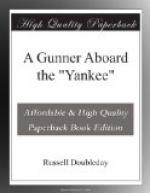But they were spectres with a grim purpose in view, and as the officer of the division strode back and forth, alert and watchful, they followed his movements with their eyes, eager for the word that would set them in action. They were not veterans, and their experience in war could have been measured by days, but they were honestly ready to fight and to shed the last drop of their blood for the flag waving over the taffrail.
It was a ticklish situation. Even the “Kid,” with his careless, happy-go-lucky mind, would have admitted that; but as time passed without bringing a break in the monotony of waiting, we began to feel restless. The tension was still great, but the first sense of apprehension was gone.
“I do wish something would happen,” muttered “Hay,” after a while. “Can you see anything from that port, ’Morrie’?”
“A wall of blackness, that’s all,” replied the Rochester man.
“We’ve changed our course several times,” spoke up Flagg. “I think the ‘old man’ is scooting for cover.”
“Fool if he didn’t,” growled Tommy. “They have a pretty habit of court-martialling naval officers when they risk their ship unnecessarily. If Captain Brownson should fail to do all in his power to escape from what his judgment tells him is overwhelming odds, he’d find himself in trouble. Discretion is the better part of valor, even in the navy.”
Suddenly we began to notice a peculiar glow tinging the darkness, and reflecting from the polished parts of the gun. It came suddenly and with a spurt of ruddy light unmistakable.
“It’s a fire somewhere,” exclaimed Flagg. “Look! it’s getting brighter.”
“It comes from this ship,” cried “Stump,” edging toward the port. “Is it possible the old hooker is on fire?”
We waited for the ringing of the alarm bell, or the call to “fire quarters,” but the minutes slipped by without the summons. Outside, the ruddy glare tinged the surface of the sea, sparkling from foam-crested waves, and forming a circle of dancing light through which the “Yankee” speeded on in her flight for safety.
Our curiosity increased apace, and we watched eagerly for passing messengers or for some stray word that would explain the peculiar phenomenon. It was Kennedy who finally solved the mystery—Kennedy the luckless, he whom we dubbed “Lucky Bag,” because of his propensity to allow his wearing apparel to find its way into the clutches of “Jimmy Legs.” Kennedy had slipped near the port and was trying to perform the difficult feat of scanning the upper deck from the opening.
“Come back here and stop that ‘rubber-necking,’ No. 7,” called out Tommy. “Do you want to get on the report?”
“For the hundred and ’steenth time,” added “Stump,” with a grin.
“Perhaps he’s seasick,” suggested “Dye.” “It’s about due. He hasn’t heaved up his boots since noon.”
“Did you hear what ‘Cutlets’ said to him yesterday?” spoke up “Hay.” “He was ‘wigging’ Kennedy, and he remarked in his tender way, ’Look here, you hero, why don’t you brace up and be a man? You are continually sick or on the report, and you aren’t worth your salt. Get down below now, and fill your billet.’ Poor devil! he tries to do his best, I guess.”




